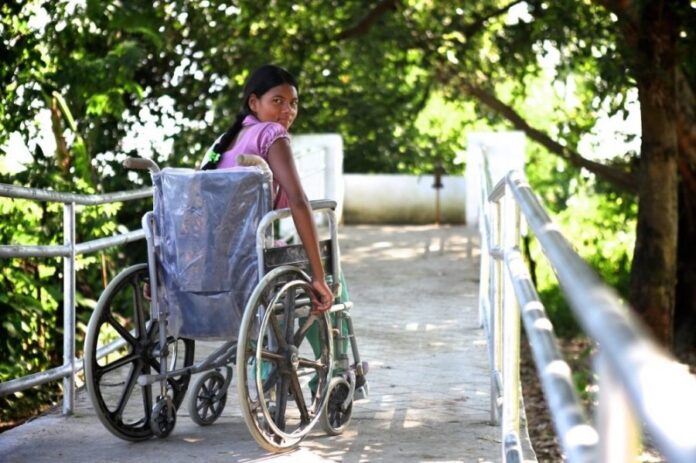By Selben Penzin,
Editor’s Note: We must pay attention to the needs of persons with disabilities to ensure that they have an equal opportunity to participate in every aspect of life to the best of their abilities and desires. In this piece, Dr Selben Penzin, ophthalmologist, public health researcher and senior programme manager at Sightsavers, shares some ideas on how to make healthcare services disability inclusive.
Persons with disabilities are more likely to experience significant disadvantages when it comes to accessing health, resulting in adverse socio-economic outcomes and higher rates of poverty than the general population. They also encounter attitudinal and environmental barriers that hinder their equal and effective contribution to society. In Nigeria, there are over 29 million people with disabilities, and it is estimated that nine out of ten Nigerians with disabilities live in poverty. Despite the millions of persons with disabilities in the country, many public buildings have no wheelchair access, poor signage, narrow doorways, internal steps, inadequate bathroom facilities and inaccessible parking areas.
Disability inclusion ensures that persons with disabilities are included in everyday activities; encouraging them to have roles similar to their peers who do not have a disability. It requires making sure that adequate policies and practices are in effect, implementing those policies and encouraging organisations and companies to adopt them. Making health services disability inclusive does not just benefit people with disabilities, it benefits everyone. An easily accessible building may also help a pregnant woman, or plain language medical documents may be easily understood by young and elderly people.
At Sightsavers, working as the Programme Manager for Eye Health on Inclusive Futures, a programme that works with local partners to improve eye care services for persons with disabilities in Nigeria, it has been clear to see the positive impact that disability inclusive healthcare can have for people who have always been excluded from these services.
In 2019, the Discrimination Against Persons with Disabilities (Prohibition) Act 2018, was signed into law. Some of the provisions made by the act include the right to employment, education, health and accessibility of physical structure. The National Community of Persons With Disabilities finalised the Accessibility Minimum Standard Policy which mandates that all public buildings are accessible to people with disabilities. It is to become operational in January 2024. Non-compliance attracts a fine, so the following guidance will help organisations prepare. To be better prepared and ensure healthcare services are disability inclusive, organisations should:

Plan: It is vital to ensure that organisations allocate sufficient time and resources to designing their project. This means engaging a wide variety of stakeholders to get input before starting; they should not just ask people to review something that has already been designed. Some of the best ways found to engage persons with disabilities is through in-person workshops and, more recently, adapting virtual workshops due to the COVID-19 restrictions.
Meaningfully engage persons with disabilities: A key phrase in disability activism is, ‘nothing about us without us.’ It is ineffective to plan any kind of services, or design infrastructure for persons with disabilities without getting input from those with lived experiences. It is important to allocate a specific amount in the organisation’s budget for essential requirements like sign language interpreters and personal assistants. This will allow for people to be meaningfully involved.
It is also good practice to remunerate organisations that include persons with disabilities for their engagements in key activities, this communicates to them that their work is just as relevant.
Make facilities accessible: A good place to start when assessing accessibility to healthcare services, is with the facilities and infrastructure. High quality medical care is no good if someone in a wheelchair cannot get through the door to experience it.
To assess how accessible facilities are, organisations should trial their facilities by walking around it with persons with disabilities and health partners to see who can use what, and what barriers they face. Sightsavers has created an accessibility standards and audit pack to help organisations do this assessment, it can also serve as a guide to the development of new health facilities.
Staff and partners should be trained on inclusion: Staff should know how to be disability inclusive. Organisations ought to conduct a training needs assessment of the health workers and service providers involved in their project. They can then develop training resources on disability inclusion and gender equity.
Collect inclusive data: Data will help to build on the work carried out by the organisation, they would need to learn who they are working with and identify gaps. Organisations should collect disaggregated data on age, gender, and disability using internationally validated tools, such as the Washington Group Questions.
They can then link this disability data with people’s experience of service provision. This means finding out about access, treatment, patient satisfaction and more. This data can be analysed and used to inform interventions.
Gather learnings: Organisations should make sure they gather the data, evidence and learnings which emerge from their initiative. Photographs make great evidence, so they should ensure they gather the evidence at every stage. It is key to note that learnings can come from unexpected sources, disability organisation representatives, hospital staff, or even facility users.
Knowledge sharing is critical to influencing relevant development stakeholders such as the government, service providers, international organisations, and others.
Implementing the National Disability Act
Nigeria has made some progress towards achieving a disability-inclusive society by passing the National Disability Act which has been domesticated in some of the 36 states in the country — Plateau, Ekiti, Lagos, Bauchi and Kaduna.
Plateau, Ekiti, Lagos, Kaduna and Bauchi States — have state level disability laws
In compliance with the Act, the National Commission of People with Disabilities (NCPWD) was also established to oversee access to housing, education, and healthcare for persons with disabilities. However, the Act has not been fully implemented and so it is important that government — at all levels, policymakers, partners and advocates make a concerted effort to address the barriers that make it difficult for people with disabilities to function and ensure full implementation of the National Disability Act.
Article from Nigeria Health Watch


